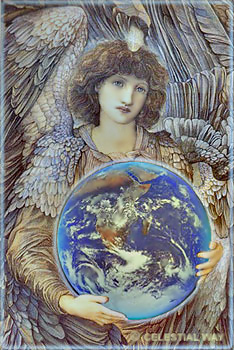 Many / One
Many / One
A database of 11,000+ illuminated guiding quotations in 40 categories from 600+ inspired books by our most brilliant and influential authors.
Compiled by JoAnn Kite
SHOW detailed search and navigation
| Quotes |
References |
JoAnn
| 1 |
 |
"Know that all of Nature is but a magic theatre, that the great Mother is the master magician, and that this whole world is peopled by her many parts." Shvetashvatara Upanishad
|
|
| 2 |
 |
"When the mind becomes clear, and the heart becomes pure, then can the Self be known. And those who know It enjoy eternity." Katha Upanishad
|
|
| 3 |
 |
"There is no death, only a change of worlds. Understood aright, life is the uninterrupted glory of the Divine." Translators
|
|
| 4 |
 |
"'The beginning' is ongoing, as the eternal unfolding of the Natural Law that governs the universe, moment to moment. In theological terms it is the continuous and invincible enactment of the will of God." Translators
|
|
| 5 |
 |
"The universe is a vast hologram, with the potential of the totality accessible in each of its myriad fragments." Translators
|
|
| 6 |
 |
"Latent spiritual intelligence is our human birthright, waiting to be uncovered. It is the one tool that is indispensable if we are to solve our manifold problems. The fruit of this intelligence is the realization that we are one Self." Translators
|
|
| 7 |
 |
"The eye of wisdom continues to see the play of opposites, of course, but it is no longer blinded to the all-embracing unity that underlies, interpenetrates, and harmonizes them." Translators
|
|
| 8 |
 |
"Jewish mystics praised the Self as the radiant indwelling Shekinah, and Islamic Sufis adored it as 'the Beloved', while the fourteenth-century German monk Meister Eckhart preached of it as 'the desert beyond God.' Six hundred years later, the scholar and mystic Thomas Merton described the Self as 'the infinite I Am which is the very name of the Almighty.' Examples such as these are legion, found in all the world's faiths." Translators
|
|
| 9 |
 |
"When the conceptual veil through which we ordinarily see the world is lifted, each limited object shines with the boundless light of the spirit, and each transitory experience is a celebration of eternity." Translators
|
|
| 10 |
 |
"Beyond all conception, the universal light shines forth. It is the great One, smaller than the smallest, farther than the farthest, nearer than the nearest. The wise know It resting deep within." Mundaka Upanishad
|
|
| 11 |
 |
"You are the one God, hidden in all. You are everywhere, the inner Self of all, the seer of deeds, dwelling in all, the uninvolved witness, knowing all, pure Consciousness." Shvetashvatara Upanishad
|
|
| 12 |
 |
"O Brahman, You are One….Having taken form, You face in all directions. You are the deep blue butterfly. You are the parrot, green with red eyes. You are the father of lightning. You are the seasons and the seas. Unborn, you are everywhere, and all that is, is born from You." Shvetashvatara Upanishad
|
|
| 13 |
 |
"The Self that is here in a person, and the Self that is there in the sun, He is one." Taittiriya Upanishad
|
|
| 14 |
 |
"By knowing Him who is subtler than the subtlest, the still center of all activity, the fashioner of forms, enfolding the universe in His embrace, by knowing Him as Love, we find eternal peace." Shvetashvatara Upanishad, IV.8-14
|
|
| 15 |
 |
"The one 'I Am' at the heart of creation, You are the light of life." Shvetashvatara Upanishad
|
|
 Many / One
Many / One
